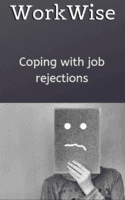You’ve worked on your CV and applied for a few jobs and you’ve had no response from anyone! This is a tough situation to deal with and it often leads to us thinking negatively about ourselves. There’s so much competition for jobs that it’s really hard to get one. It can be very difficult to cope with as we tend to take the rejections personally, as if we aren’t good enough as human beings. The truth is that everyone suffers from job rejections and so we need to find a way to move forward without feeling too crushed.
Here are a few ideas on coping with job rejections:
• Acknowledge your feelings
It’s important to acknowledge how you are feeling about the rejections. Pretending that you don’t feel a certain way doesn’t help you. Setting aside some time to acknowledge how you feel will give you some clarity about your state of mind. This doesn’t mean that you need act out your emotions. Shouting at someone or being aggressive is acting out an emotion of anger which is different from acknowledging that you are angry. Just be aware that you have these feelings, but that they will pass. Also work on changing your perspective: remember that the rejections aren’t personal; it’s the job market that is really difficult and that it’s not your fault.
• Keep a positive attitude
Do you know that humans are actually hardwired to think negative thoughts about twice as much as positive ones? Our ancestors needed to avoid as many negative situations as they could to survive which means that our brains developed a bias towards negative thinking. When we feel rejected, in romance, work or any other way, we question our self-worth and pile up negative thoughts about ourselves. We are hard on ourselves and this leads to us feeling as if we aren’t good enough. Allowing ourselves to drown in our feelings isn’t very useful. You do need to acknowledge your feelings but then move forward and not get stuck in them. Try and avoid going down this negative emotional spiral as it won’t help you with your future job hunting. Keep as positive as you can. Perhaps your covering letter needs to be more carefully tuned to the position? Perhaps you need to do more research on the organisation to make you stand above the rest of the applicants?
• Be resilient and stay focused
If you have applied for several jobs and have had no success, you might start to lose focus and feel out of control about the situation. Being resilient and bouncing back from challenges is important. You’ll need to adapt to the curveballs that life throws at you and find ways to adapt and focus on hunting for a job. There’s value in widening your job search and thinking creatively about where you may find success. Perhaps you aren’t applying to the right kind of jobs? Perhaps you need to review your CV? Is it perfect? Is it well written? Have you focused you CV on the position you’re applying to? You can maintain focus by knowing your strengths, skills and motivations which allows you to develop a job search strategy that suits these areas. This will help you to write an impactful CV and covering letter which will stand out when recruiters short list candidates. In the face of rejection, focus on what you can learn from the situation, build on the positives and plan the next steps. What can you do differently to increase your chances to be short listed for an interview?
• Improve your chances
Often hundreds of people will apply to a job advertisement. The recruiter will look through all the covering letters and CVs and chose a short list of people to be interviewed. This is why your written documents are so important. You need to make every application that you send show how your skills, knowledge and experience will suit the job you’re applying for. If you’re short on skills or experience, perhaps you need to think about internships or volunteering opportunities in the areas you’re interested in. Offering your services to gain experience may well help you to step more easily into the job market. Or, perhaps, you can do something entrepreneurial or take a short course to improve your chances? There are many free online courses that can help. Look for creative ways to make you the top candidate for a position, or for an area of work that you are interested in.
• Send out more job applications
Once you’ve relooked at your job hunting strategies and defined what you can do differently to stand out from the other applicants, it’s time to send more applications out. Send several out at once so that you don’t think of only one job as being the one for you. This reduces your disappointment should you be rejected and saves you time. Set aside a chunk of time to write your covering letters (remember to adapt them for each position) and send them out together with your improved CV. Keep in mind that you need to work around your strengths (what you’re naturally good at), your skills (what you have learnt to do) and your knowledge (what you know about a certain area) in order to create a good impression.
The job market is very tough and it’s difficult to get a job. There are going to be rejections. That’s the sad truth. But don’t take these rejections personally. They aren’t about you not being good enough as a person; rather that there was someone else who was a better fit for the organisation. There is steep competition out there and you need to adapt to the needs of the job market. Keep working on your job hunting strategies and one day you’ll be the lucky one!
Tell us: are these tips useful? Have you got any other ideas about coping with job rejections?



